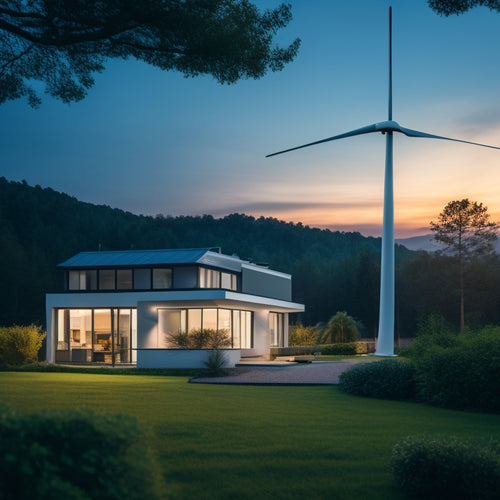
EmpowerDC: Unleashing Electric Vehicle Resources
Share
EmpowerDC's electric vehicle resources hub offers a thorough platform for individuals and businesses to access educational materials, incentives, and tools, supporting the widespread adoption of electric vehicles in the nation's capital. The hub provides informational resources, including EV 101 and EV Charging 101, as well as access to rebates, tax incentives, and funding opportunities. Additionally, EmpowerDC's Transportation Electrification Strategy aims to achieve a 100% zero-emission transportation sector by 2045. By exploring EmpowerDC's resources, individuals and businesses can uncover the incentives and benefits that make electric vehicles an attractive option, and discover a seamless shift to electric transportation.
Key Takeaways
• EmpowerDC's Electric Vehicle Resources Hub offers educational materials, incentives, and tools to support EV adoption and integration into daily life.
• The Transportation Electrification Strategy aims for a 100% zero-emission transportation sector by 2045, with goals for public and school buses, and widespread charging infrastructure.
• Federal and local incentives, including tax credits and rebates, greatly reduce the cost of owning an electric vehicle, making them an attractive option.
• Utility incentives and savings programs, such as Pepco's EVsmart program, provide discounts, rebates, and lower electricity rates for EV owners.
• Alternative fuel incentives, including the Alternative Fuel Infrastructure Credit and Alternative Fuel Conversion Tax Credit, offer additional financial benefits for EV owners.
Electric Vehicle Resources Hub
EmpowerDC's Electric Vehicle Resources Hub serves as an all-inclusive portal, providing District of Columbia residents and businesses with access to a wide range of informational resources, incentives, and tools to support the adoption and integration of electric vehicles into daily life.
This all-encompassing platform facilitates EV adoption by offering educational materials, such as EV 101 and EV Charging 101, to educate users about electric vehicles and charging solutions.
Additionally, the hub provides access to rebates, tax incentives, and funding opportunities, including federal tax incentives and utility incentives for EV chargers and charging infrastructure.
Transportation Electrification Strategy
The District of Columbia's Transportation Electrification Roadmap outlines a thorough strategy to achieve a 100% zero-emission transportation sector by 2045, encompassing a multifaceted approach to electrify public and private fleets, infrastructure, and personal vehicles. This roadmap envisions a complete shift, including 100% replacement of public and school buses, and 25% of vehicles registered in DC being zero-emission by 2030.
| Goal | Target | Timeline |
|---|---|---|
| Electrify public transportation | 100% replacement of public and school buses | 2045 |
| Increase private electric vehicles | 25% of vehicles registered in DC | 2030 |
| Develop charging infrastructure | Widespread public and private charging infrastructure | Ongoing |
This roadmap prioritizes the development of charging infrastructure, supporting the growth of public and private electric vehicles. By focusing on public transportation and charging infrastructure, the District aims to create a seamless shift to a zero-emission transportation sector.
Federal and Local Incentives
Numerous federal and local incentives are available to encourage the adoption of electric vehicles, offering financial benefits and tax credits to individuals, businesses, and organizations. Federal tax breaks, such as the EV tax credit of up to $7,500, provide a substantial incentive for purchasing an electric vehicle.
Additionally, the High Efficiency Vehicle Excise Tax Exemption offers a median excise tax exemption per vehicle purchase. Locally, rebates and funding opportunities are available to support the adoption of electric vehicles. These incentives can greatly reduce the cost of owning an electric vehicle, making them a more accessible option for many.
Utility Incentives and Savings
Offering a variety of benefits, utility incentives and savings programs can greatly reduce the cost of owning and operating an electric vehicle, making them an attractive option for environmentally conscious consumers.
Through Pepco's EVsmart program, residents and businesses can access EV charger discounts and rebates, helping to offset the cost of installing and operating EV charging infrastructure.
Additionally, utility incentives can provide significant savings on electricity rates for EV owners, further reducing the overall cost of ownership.
Alternative Fuel Incentives
Beyond utility incentives, alternative fuel incentives provide additional financial benefits for electric vehicle owners, including tax credits for alternate fuel infrastructure and conversions that can greatly reduce the cost of moving towards a more environmentally friendly transportation option.
The Alternative Fuel Infrastructure Credit offers benefits for infrastructure development, with unused credits carrying forward.
The Alternative Fuel Conversion Tax Credit provides fuel conversion benefits, applicable to eligible fuels such as biodiesel, hydrogen, and electricity.
It is essential to note that incentive expiration dates apply, and owners should be aware of the deadlines to maximize their benefits.
Frequently Asked Questions
Can I Charge My Electric Vehicle at a Friend's House?
Prior to charging your electric vehicle at a friend's house, obtain their permission and familiarize yourself with their homeowner's rules, ensuring compliance with their electrical infrastructure and any potential restrictions.
How Do I Properly Maintain My Electric Vehicle's Battery?
To guarantee peak performance, correctly maintain your electric vehicle's battery by performing regular Battery Calibration, monitoring Voltage levels, and adhering to manufacturer guidelines to prevent degradation and extend lifespan.
Can I Install an EV Charger in a Rented Property?
Before installing an EV charger in a rented property, make sure you obtain landlord permission and review rental agreements to understand any restrictions or requirements, as some may have specific guidelines or regulations governing charger installation.
Are Electric Vehicles More Expensive to Insure?
Like a stormy weather forecast, insurance rates for electric vehicles (EVs) can be unpredictable, with premium costs influenced by factors like model, location, and driver behavior, making it essential to shop around for quotes to find the best coverage.
Can I Use a Standard 120V Outlet to Charge My Electric Vehicle?
When charging an electric vehicle with a standard 120V outlet, consider the charging speed and outlet safety. Level 1 charging takes 12-24 hours for a full charge, and it is crucial to confirm that the outlet can handle the increased power load to avoid overheating and potential fires.
Related Posts
-

3 Best Solar-Powered Biodegradable Accessories for Your Home
You're taking a significant step towards a more sustainable lifestyle by incorporating solar-powered biodegradable ac...
-

Why Merge Earth's Heat With Sun's Energy?
You're about to utilize the full potential of renewable energy by combining the Earth's natural heat with the Sun's a...
-

10 Grid-Tied Wind Power Systems for Modern Homes
You're looking for a grid-tied wind power system to utilize wind energy for your modern home. Here are ten options to...


